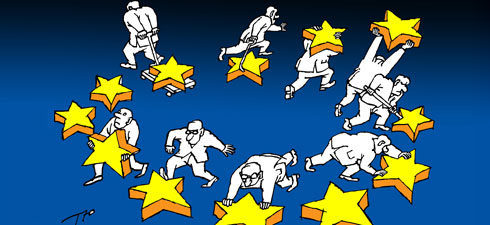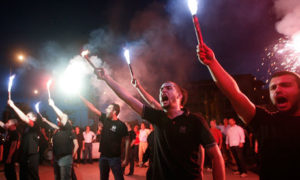
Cartoon: Sergey Tyunin
How can the EU still advertise itself on the global stage as being the embodiment of democracy and human rights? This question should be raised and asked in Brussels as many of EU member states are seriously flirting with the extremes. The latest developments in Greece – only to name one out of the group of 27 – are too worrisome to be ignored.
In the case of Greece, the situation is so bad that the U.S. State Department released on Nov. 16, 2012 an alert for U.S. citizens travelling to Greece, reading:
The U.S. Embassy informs U.S. citizens that the “Threats To Safety and Security” section of the Greece Country Specific Information page has been updated to inform U.S. citizens of a rise in unprovoked harassment and violent attacks against persons who, because of their complexion, are perceived to be foreign migrants. U.S. citizens most at risk are those of African, Asian, Hispanic, or Middle Eastern descent in Athens and other major cities. Please review the Country Specific Information for Greece.

Photograph: AFP/Getty Images
Ironically, Greece , which calls itself the birthplace of democracy, has become a nightmare for any individual of color. Militia groups, mostly located in Athens, are targeting immigrants – legal or illegal – in the street as used by the brown and black shirts in the ’30s against the Jews, Communists, gays, and other minority groups in Germany and Italy. The political party Golden Dawn has been the axiom of this orchestrated violence. Recently the Council of Europe, an international organization and not an EU institution, took on the situation in Greece. The Commissioner for Human Rights published a report on the findings based on his visit to Greece in early February 2013. To put it in simple terms, this is not pretty. Here are some parts of the report:
The Commissioner is seriously concerned by the increase in racist and other hate crimes in Greece, which primarily targets migrants and poses a serious threat to the rule of law and democracy. A number of the reported attacks have been linked to members or supporters, including MPs, of the neo-Nazi political party “Golden Dawn” which won seats in parliament in June 2012. Whilst welcoming the fact that the Greek authorities have adopted new measures to combat racist violence, the Commissioner regrets that rhetoric stigmatising migrants has been widely used in Greek politics and that immigration control measures have led to the further stigmatisation of migrants. The Commissioner calls on the authorities to condemn firmly and unequivocally all instances of hate speech and hate crime. Political parties and the parliament in particular need to adopt self-regulatory measures to effectively counter and sanction intolerance and hate speech on the part of politicians. Far-reaching and systematic anti-racism and human rights awareness-raising campaigns should also be implemented, targeting particularly young people and schools. The completion and execution of a national human rights action plan that is envisaged by the authorities may play a catalytic role in this context. The authorities are invited to design and implement measures to improve migrants’ integration as well as intercultural dialogue, drawing upon successful existing structures such as the Athens City Council for Migrants’ Integration. In this context, the construction of a mosque and a Muslim cemetery in Athens is noted as long overdue. Lastly, the Commissioner expresses his concern at the envisaged restrictive change in the law concerning the naturalisation of long-term resident migrant children and the political participation of long-term resident migrants at local level, and calls on Greece to accede to the 1997 European Convention on Nationality and the 1992 European Convention on the Participation of Foreigners in Public Life at Local Level and draw on its human rights standards. […]
12. In addition to migrants, other social groups have also been targeted by hate speech and violence, namely Roma, members of the Muslim minority of Turkish ethnic origin, LGBT persons and human rights defenders. […]
14. The Commissioner notes that a number of the reported racially-motivated offences have been attributed by victims to members or supporters of “Golden Dawn”, a neo-Nazi political party that won 6,92% of the vote in the national elections of June 2012 and 18 seats in the Greek Parliament. During the electoral campaign of 2012, this party made extensive use of anti-migrant messages and leaders of the party have frequently used racist, antisemitic or homophobic rhetoric, including inside the Greek Parliament. […]
21. The serious risks posed to democracy by intolerance and racism and by the political forces that foster these trends have been acknowledged at the highest political level in Greece. The President of the Republic, Karolos Papoulias, in his message on the occasion of the 38th anniversary of the restoration of democracy in Greece in July 2012, noted that Greek democracy today “faces serious dangers from the ideology of hate and fascism”. He reiterated his serious concern in the New Year statement that he made on 31 December 2012. […]
37. The Commissioner shares the grave concern expressed by the European Commission against Racism and Intolerance, through its statement of 10 December 2012, at racist and xenophobic political activities in Greece, particularly those of “Golden Dawn”, a neo-Nazi, racist and xenophobic political party that is now represented in parliament. It is regrettable that this party has created a negative climate within Greek society and has imposed fear upon communities of migrants and other vulnerable social groups. This situation needs to be reversed by sustained and concerted efforts of all competent authorities. […]
This report is quite powerful as it publically called Golden Dawn a neo-nazi party as well as recommended banning such group from political life. These perpetual violations of basic human rights in Greece are a shame for not only the country and its citizens, but as well for the European Union, which has not done enough on the matter.
So what is behind these different waves of populism and racism? Is it the euro crisis? Or is it cultural? For too long, the euro crisis has been blamed. Experts, scholars, journalists and politicians have claimed that the austerity measures, leading to the demise of the welfare state, taking place throughout Europe were the reasons for the rise of populism. Well, is it really enough? In a commentary published by the Center for European Reform, Katinka Barysch asked the following question: Is the euro crisis responsible for populism? On the case of Greece, she wrote:
Greece is also one of the few places where the crisis has boosted the extreme right. One reason is growing resentment of the million-odd immigrants who arrived during the good years. Another is the breakdown of law and order that has accompanied the Greek economic collapse. The state is in such disarray that many Greeks now welcome Golden Dawn’s black-shirted hoodlums bringing some ‘order’ to their neighbourhoods – even if that entails hundreds of immigrants ending up in hospital after brutal beatings.

Photograph: Grigoris Siamidis/Reuters
The three great civil wars on the European continent were not only fueled by economic problems. Every time economic difficulties emerge how come such types of xenophobic and racism movements grow this fast and actually gain support from a segment of the population? One explanation is that these ideas and beliefs are always present and are sleeping under the rock until someone flips it over. Even though racism cannot be eradicated, one could have thought/hoped after the horrors perpetuated by the Nazis during World War II that such ideology would be so shameful for human dignity that it would be unacceptable to defend it or even promote it. Obviously, we were wrong.
It is always worrisome to see the narratives of hate against a constructed “other.” In the case of Greece, the “other” is the immigrant, legal or illegal. There is a need to conclude that violence against any types of “other” is inadmissible especially on a continent describing itself as advanced and democratic; take it for whatever it means. After all, Francis Fukuyama was wrong; we are not assisting at the end of the history, but to its perpetual beginning. Europe is at a dangerous crossroad and must take a hard look at itself. Let’s face it: Despite its beautiful monuments and countryside, the visage of Europe is far from being pretty.